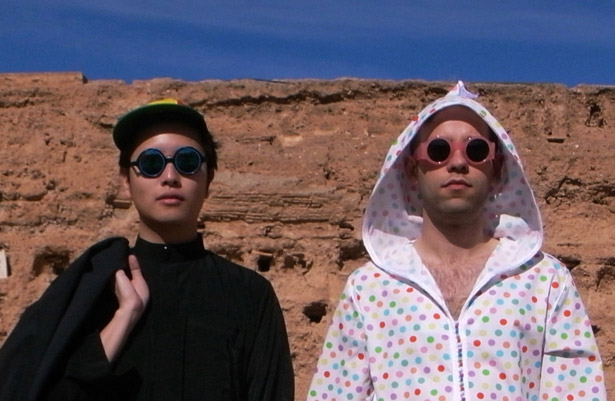Marrakech Biennale

The Marrakech Biennale - formerly Arts in Marrakech (AiM) Biennale - is a Moroccan festival of contemporary international culture. In February 2012 the Marrakech Biennale will launch its fourth edition, Surrender, featuring key figures in literature, film and visual arts. Public screenings, talks, performances and debates will take place at diverse venues and locations around the city 29th February-4th March 2012.
Photo © ALAOUI moulay abdallah
In 2004 with the rise of global tensions, Vanessa Branson envisioned a cultural festival that would address social issues through the arts, using them as a vehicle for debate and discussion and to build bridges between diverse ideologies. The Marrakech Biennale would become a celebration of creativity in a city that has been the focus of artistic exploration for centuries but until now with limited emphasis on contemporary art.
First held in 2005, the Marrakech Biennale is the first major trilingual (English, Arabic & French) festival in North Africa focusing on cutting-edge contemporary art, literature and film. By bringing together artists, film makers and writers from around the world the Biennale aims to promote the status of the artist and contemporary culture in North Africa and to dynamize the regional creative scene. Held every two years, the Marrakech Biennale promotes inter-cultural and inter-disciplinary exchanges through an educational approach that addresses art professionals, students and the general public.
The Biennale has grown to become an internationally recognised event with a thriving visual art, film and literature programme. Past participants at the Marrakech Biennale have included Francis Alys, Yto Barrada, John Boorman, Richard E. Grant, Edmond El Maleh, Tracy Emin, Pieter Hugo, Isaac Julien, Abdellah Karroum, Joseph Kosuth, Julian Schnabel, Sadie Smith and Abdellah Taia.


The Marrakech Biennale is pleased to announce the participation of Roger Hiorns, Rian Malan, Mira Nair, Kevin Macdonald, Hicham Lasri, Geoff Dyer, Anthony Horowitz, Faouzi Bensaidi, Dominic West and CocoRosie amongst others.
In this, its fourth and largest edition, the Marrakech Biennale is in partnership with; Dar al-Ma’mûn residency, Institut Français, Palais de Tokyo, British Council, Puma, Helisud Maroc, Calvert 22 Gallery, Tate, ESAV Film School, On Spot Story, Travel Link Morocco and the Goethe Institute.
Visual arts: As part of the Biennale, Higher Atlas, a major exhibition curated by Carson Chan and Nadim Samman, will take place at the Theatre Royal in Marrakech (29th February-3rd June 2012). High connotes reverie and transcendence. Higher Atlas suggests a cartography of the beyond. All works will be new site-specific commissions, conceived and created on location with local craftspeople and manufacturers. Over twenty-five international artists, architects, writers, musicians and composers will be showing their work, including Karthik Pandian, Aleksandra Domanovic, Jon Nash, Juergen Mayer H and Turner Prize nominated Roger Hiorns. The exhibition seeks to engage in an expansive dialogue with the city.
Co-curator Carson Chan notes: “While trying to curate an exhibition that could become part of a contemporary Moroccan cultural identity, we can also challenge the received methods of biennale making that is routinely practiced elsewhere. Do we have to show art? Why not commission a novel, a symphony, an album or a prayer? “
Film: Alan Yentob, creative director of the BBC, leads the advisory board curating the film programme with discussions, screenings and debates held in Riad El Fenn and the ESAV film school. Confirmed participants include Anthony Horowitz, Dominic West, Lubna Azabal, Faouzi Bensaidi, Kevin Macdonald, Michael Souvignier and Hicham Lasri.
Literature: Omar Berrada, Benedicte Clarkson and Elizabeth Sheinkman organise the literature events which include Rian Malan and Geoff Dyer and take place at the 17th century townhouse, Riad El Fenn. Readings, performances and interventions will also be taking place around the city.
Debate: A series of conversations on art and identity, presented by Dar al-Ma'mûn and featuring curators, editors and critics from the international art world, including Aziz Daki (Atelier 21), Simon Njami (Revue Noire), Khadija El Bennaoui (Art Moves Africa) and Negar Azimi (Bidoun). http://dam-arts.org
Education: In order to promote access to contemporary culture for all ages, the 4th Marrakech Biennale will conduct workshops for children lead by local and international cultural practitioners, in partnership with Zidzid Kids. An internship programme pairing artists with students from the l'Université Cadi Ayyad Marrakech (UCAM) has also been established.
Official Parallel Projects: Official Parallel Projects are selected as an integral section of the Biennale, and autonomously organized by the promoting institutes/individuals. We aim to fuel creative production in Marrakech during the Biennale dates with many international and local organisations involved, including Biennale Off, Atla(s) Now and Studio R22.
General: These three months aim to highlight Morocco as a dynamic hub for current ideas and to establish its continued intellectual involvement on an international stage. The biennale’s role, both locally and internationally, has evolved along with the climate of the times. In light of recent events in North Africa, its goals could not be more pertinent. In addition to sponsoring significant and lasting social, economic and cultural benefits for the area and its inhabitants, the Biennale aims to show the outside world that Morocco is an open society that encourages freedom of expression and debate.
morocco culture,moroccan food,morocco food,moroccan cuisine,morocco beaches,moroccan meal,beaches in morocco,moroccan culture,hercules cave,hercules cave morocco